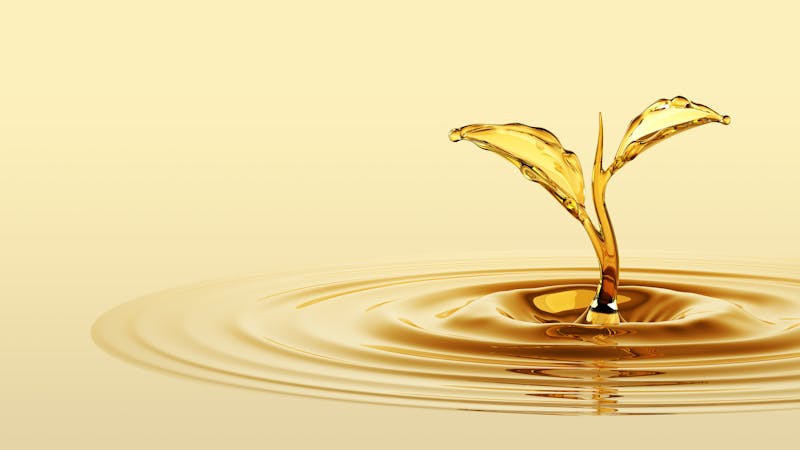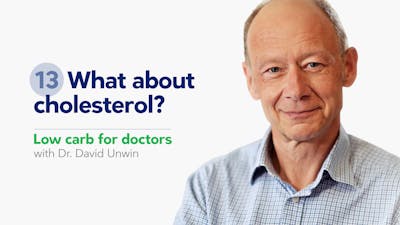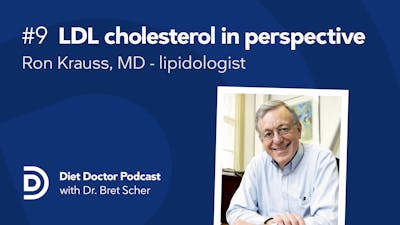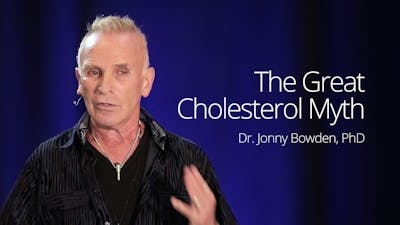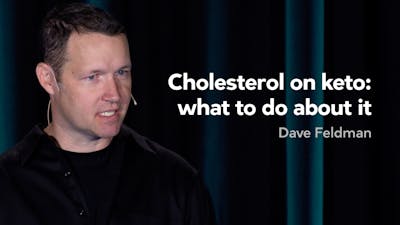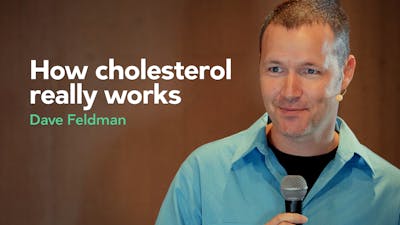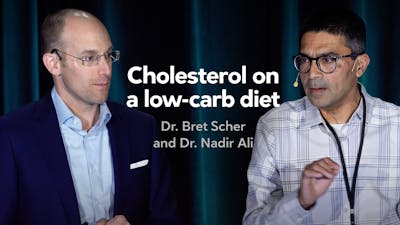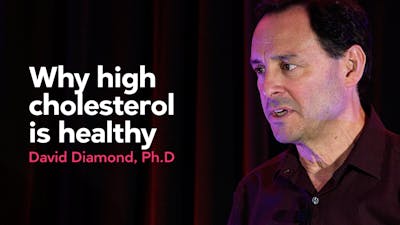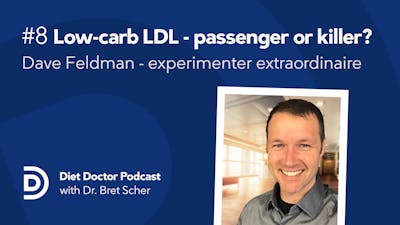Cholesterol and
low-carb diets
Read on to learn what cholesterol is, how your body uses it, why low-carb and keto diets may lead to a change in blood cholesterol levels, and whether you should be concerned if your cholesterol increases with a keto or low-carb lifestyle.
This guide is our attempt at summarizing what is known. It is written for adults who are concerned about cholesterol and health, especially when eating a low-carb diet. Discuss any lifestyle changes with your doctor. Full disclaimer
For even more details and relevant research on connected topics, see our guides to healthy fats, vegetable oils and saturated fats. Also see our list of core scientific studies related to heart disease, cholesterol and saturated fats.

The basics: What is cholesterol?
Cholesterol is a waxy substance that is essential for the life of all animals, including humans.2 Cholesterol is found in virtually every cell of your body and is necessary for many bodily functions, including:
- Cell integrity: As an integral part of every cell membrane in the body, cholesterol is required for maintaining cell structure and fluidity.
- Hormone synthesis: Cholesterol is needed to make steroid hormones such as estrogen, testosterone, cortisol, and other related hormones, such as vitamin D3.
- Creation of bile acids: Your liver converts cholesterol into bile acids, which help you absorb fats and the essential fat-soluble vitamins A, D, E and K.
- Myelin formation: The myelin sheath that surrounds and protects nerve cells contains plenty of cholesterol.3
Your body makes most of the cholesterol that is found in your bloodstream. It’s primarily produced in the liver.
Dietary cholesterol – found in animal foods like eggs, shellfish, cheese, and organ meat – makes up a smaller portion of your blood cholesterol pool.
Unlike fat, which contains nine calories per gram, cholesterol has no calories. Because it’s present in foods in very small amounts, it’s measured in milligrams instead of grams. Most fatty meats and whole-milk dairy products contain just a little cholesterol, whereas some shellfish and organ meats are high in cholesterol, yet low in fat.
After years of advice to toss the egg yolks and eat only the whites, we’ve learned that eating cholesterol-rich foods doesn’t impact blood cholesterol levels very much. In fact, when people take in more cholesterol from food, the liver usually produces less, resulting in stable blood cholesterol.4
You can learn more about cholesterol, including the specific types of lipids and lipoproteins, in our evidence-based guide: What is cholesterol?
How does keto or low-carb eating affect your cholesterol?
For most people, there will be no adverse effects on blood levels of lipids when consuming a ketogenic diet. Typical findings are stable LDL cholesterol levels, a decrease in triglycerides (good), and an increased HDL cholesterol (also good). Some people will even see a drop in their LDL.5
In some people, a keto or low-carb diet will result in an increase in both LDL and HDL cholesterol levels.6 Or, there is an increase only in HDL cholesterol resulting in an improved LDL/HDL ratio.7
One meta-analysis of randomized trials reported that people eating a low-carb diet, on average, experience a reduction in both total LDL and small LDL particles, as well as an increase in the peak LDL size.8
However, for an estimated 5 to 25% of people – whether weight loss occurs or not – LDL cholesterol goes up significantly in response to very-low-carb diets, sometimes by 200% or more.9
The exact mechanism for the rise in LDL is still a matter of debate, as is the clinical significance.10
Please see our dedicated guide about low-carb LDL hyper-responders for more information.
Should you be concerned if your cholesterol increases with low-carb eating?
This is an emerging area of research that is currently the focus of a great deal of debate and uncertainty.
Traditionally, experts in the field of lipids and heart disease have viewed elevated LDL cholesterol with concern because it typically reflects a high concentration of LDL particles (LDL-P) circulating in the bloodstream.
Excessive amounts of LDL particles have been found to be associated with the development of atherosclerosis, the underlying cause of heart disease.11
Despite the associations between high concentrations of LDL particles and heart disease, research has consistently shown that keto diets help reduce many heart disease risk factors in people with diabetes and other insulin-resistant conditions.12
Granted, trials showing an actual reduction in heart attacks don’t yet exist. Will the demonstrated improvement in risk factors result in a net beneficial effect despite increased LDL? That is unknown, but some evidence suggests that it may be the case.13
The fact that so many risk factors remain stable or improve with carb restriction – even if LDL cholesterol levels increase – demonstrates the importance of not viewing any one value in isolation. Instead, it may be better to look at the body as a whole system.
However, some experts urge caution. Prominent lipidologist and vocal lipid educator Dr. Thomas Dayspring states:
“The advocates of low-carb diets say there is no study showing harm of elevated LDL-P and LDL-C in patients who have eliminated or drastically reduced their insulin resistance and inflammatory markers by low carbing. That is true, but what they want to ignore is that there is no data anywhere that shows they are an exception.”
Time will tell if data support one position or the other. For now, if you want to learn more about the risk of LDL, please see our evidence-based guide: Is elevated LDL cholesterol harmful?
Five ways to lower your LDL on a keto or low-carb diet
Has your cholesterol increased on a low-carb diet? Do you fear that you may need to abandon this way of eating and its potential benefits?
Here are five ways you can reduce your total and LDL cholesterol levels while maintaining a keto or low-carb lifestyle. Consider trying them in this order, and take a look at our more detailed guide: How to lower LDL cholesterol on a low-carb diet.
1. Avoid adding fat to your coffee
Bulletproof coffee refers to adding butter, coconut fat, or MCT oil to coffee. Avoid drinking significant amounts of fat when you’re not hungry. This alone can sometimes normalize elevated cholesterol levels.14
2. Eat only when hungry
Only eat when hungry and consider adding intermittent fasting. This may reduce cholesterol levels. Although most research on intermittent fasting and LDL reduction comes from low-quality observational studies during Ramadan, a recent pilot study of time restricted eating showed a significant reduction in LDL.15 While we need more data, this remains a promising intervention.
3. Eat foods higher in unsaturated fats instead of saturated fats
Foods higher in unsaturated fats include fats like olive oil, fatty fish and avocados. Replacing sources of saturated fat with these foods may be enough to lower LDL cholesterol.
However, remember that many unsaturated oils are highly processed. As with food, we recommend focusing on the least processed oils like olive oil, macadamia oil, and avocado oil.
4. Eat LDL-lowering keto-friendly foods
These low-carb plant foods may help lower cholesterol levels somewhat:
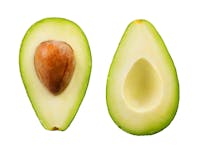




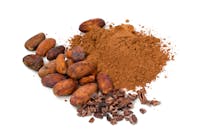

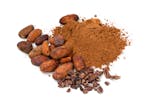

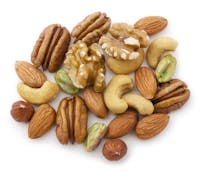

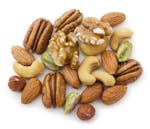

- Avocado: An analysis of 10 studies found that eating avocados on a regular basis led to a significant decrease in LDL cholesterol.16
- Green vegetables: Dark leafy greens and cruciferous vegetables bind to bile acids, which are excreted as waste rather than reabsorbed in the gut, ultimately resulting in slightly lower blood cholesterol. To maximize this effect, you may want to steam your greens rather than eating them raw.17
- Cocoa and dark chocolate: In addition to lowering LDL cholesterol, cocoa and dark chocolate might help protect LDL from becoming oxidized or damaged.18 To avoid unnecessary sugar intake, you may want to choose chocolate that contains at least 85% cocoa.
- Nuts and seeds: Nuts and seeds are rich in fiber and monounsaturated fats, which can help lower cholesterol. One analysis of 25 studies found that eating two servings of nuts per day reduced LDL cholesterol by an average of 7%.19
5. Eat more carbs
Finally, if steps 1-4 are not enough: Consider whether you really need to be on a strict keto diet for health reasons.
If a more moderate or liberal low-carb diet (e.g. 50–100 grams of carbs per day) can still work for you, it may also lower your cholesterol. Just remember to choose unprocessed carb sources (e.g., not wheat flour or refined sugar).
Recommended viewing and reading
Videos
Dave Feldman: The cholesterol network systemDr. Andrew Mente: Dietary fat and cardiovascular disease
Sarah Hallberg: LDL on LCHF
Dr. Peter Attia: The straight dope on cholesterol
Articles
Dr. Peter Attia: The straight dope on cholesterol (part 1 of 9)
Dr. Thomas Dayspring: Understanding the entire lipid profile
Start your FREE 7-day trial!
Get instant access to healthy low-carb and keto meal plans, fast and easy recipes, weight loss advice from medical experts, and so much more. A healthier life starts now with your free trial!
Start FREE trial!
Cholesterol and low-carb diets - the evidence
This guide is written by Franziska Spritzler, RD and was last updated on June 19, 2025. It was medically reviewed by Dr. Bret Scher, MD on March 10, 2021 and Dr. Michael Tamber, MD on March 11, 2022.
The guide contains scientific references. You can find these in the notes throughout the text, and click the links to read the peer-reviewed scientific papers. When appropriate we include a grading of the strength of the evidence, with a link to our policy on this. Our evidence-based guides are updated at least once per year to reflect and reference the latest science on the topic.
All our evidence-based health guides are written or reviewed by medical doctors who are experts on the topic. To stay unbiased we show no ads, sell no physical products, and take no money from the industry. We're fully funded by the people, via an optional membership. Most information at Diet Doctor is free forever.
Read more about our policies and work with evidence-based guides, nutritional controversies, our editorial team, and our medical review board.
Should you find any inaccuracy in this guide, please email andreas@dietdoctor.com.
The medical community generally accepts that elevated cholesterol is associated with increased cardiovascular risk. Examples of observational studies showing this include the Framingham study, a long-term study that has shown a strong link between cholesterol and heart disease.
Annals of Internal Medicine 1971: Serum cholesterol, lipoproteins, and the risk of coronary heart disease. The Framingham Study [observational study, weak evidence]
While we do not question the validity of that data, we do question if they are applicable to all groups in the same fashion. There are a number of studies showing that there are specific demographics and situations in which high LDL cholesterol does not correlate with increased cardiovascular risk. You can read about this in more detail in our dedicated evidence-based guide: Is elevated LDL cholesterol harmful?
↩Huff, Jialal 2019: Physiology, Cholesterol
[textbook; ungraded] ↩Hindawi 2012: Cholesterol: Its regulation and role in central nervous system disorders [overview article; ungraded]
Nature Neuroscience 2005: High cholesterol level is essential for myelin membrane growth [mouse study; very weak evidence] ↩
Arteriosclerosis, Thrombosis, and Vascular Biology 1996: Dietary cholesterol feeding suppresses human cholesterol synthesis measured by deuterium incorporation and urinary mevalonic acid levels. [randomized trial; moderate evidence] ↩
European Journal of Clinical Nutrition 2013:
Beyond weight loss: a review of the therapeutic uses of very-low-carbohydrate (ketogenic) diets[overview article; ungraded]Journal of Nutrition 2002:
A ketogenic diet favorably affects serum biomarkers for cardiovascular disease in normal-weight men [nonrandomized study, weak evidence] ↩Cardiovascular Diabetology 2018: Cardiovascular disease risk factor responses to a type 2 diabetes care model including nutritional ketosis induced by sustained carbohydrate restriction at 1 year: an open label, non-randomized, controlled study. [non-randomized trial; weak evidence]
Nutrition in Clinical Practice 2011: Low-carbohydrate diet review: shifting the paradigm [review article; ungraded]
Nutrition Reviews 2019: Effects of carbohydrate-restricted diets on low-density lipoprotein cholesterol levels in overweight and obese adults: a systematic review and meta-analysis [systematic review of randomized trials; strong evidence]
British Journal of Nutrition 2016: Effects of low-carbohydrate diets v. low-fat diets on body weight and cardiovascular risk factors: a meta-analysis of randomised controlled trials [strong evidence]
↩In a randomized trial of patients with type 2 diabetes who either were given information to eat moderate LCHF (with an increased relative intake of saturated fat) or a low-fat diet, there was no change in LDL cholesterol while HDL cholesterol increased on LCHF. Furthermore, the patients randomized to LCHF achieved better glycemic control and decreased low-grade inflammation while also reporting better health-related quality of life than those on the low-fat diet.
Diabetologia 2012:
In type 2 diabetes, randomisation to advice to follow a low-carbohydrate diet transiently improves glycaemic control compared with advice to follow a low-fat diet producing a similar weight loss
[randomized trial; moderate evidence]Annals of Medicine 2014: Advice to follow a low-carbohydrate diet has a favourable impact on low-grade inflammation in type 2 diabetes compared with advice to follow a low-fat diet[randomized trial; moderate evidence]
Diabetes Reserach and Clinical Practice 2014: Randomization to a low-carbohydrate diet advice improves health related quality of life compared with a low-fat diet at similar weight-loss in Type 2 diabetes mellitus[randomized trial; moderate evidence] ↩
American Journal of Clinical Nutrition 2021: Effect of carbohydrate-restricted dietary interventions on LDL particle size and number in adults in the context of weight loss or weight maintenance: a systematic review and meta-analysis [strong evidence] ↩
Current Developments in Nutrition 2021: Elevated LDL cholesterol with a carbohydrate-restricted diet: evidence for a “lean mass hyper-responder” phenotype [survey data and case series; very weak evidence] ↩
The authors of the paper in the previous footnote have a clinical trial in the works, designed to answer the question of whether these so-called “hyper-responders” develop atherosclerosis. You can learn more about enrolling in that trial at citizensciencefoundation.org. ↩
In atherosclerosis, LDL particles are known to end up in damaged artery walls, and connected to an inflammatory response. Over time, cholesterol, calcium, white blood cells and other substances accumulate at the site to form a plaque. Many – if not most – heart attacks and strokes are caused when a plaque ruptures and forms a clot that blocks arterial blood flow.
American Journal of Pathology 2012: Plaque attack: one hundred years of atherosclerosis in The American Journal of Pathology
[overview article; ungraded] ↩British Journal of Nutrition 2016: Effects of low-carbohydrate diets v. low-fat diets on body weight and cardiovascular risk factors: a meta-analysis of randomised controlled trials [strong evidence]
Nutrition Reviews 2018: Effects of carbohydrate-restricted diets on low-density lipoprotein cholesterol levels in overweight and obese adults: a systematic review and meta-analysis [strong evidence] ↩
For example, a 2009 randomized study comparing a low-fat diet to a very-low-carb diet in people with metabolic syndrome found that the very-low-carb diet was more effective at improving many cardiovascular health markers.
Lipids 2009: Carbohydrate restriction has a more favorable impact on the metabolic syndrome than a low fat diet [randomized trial; moderate evidence]
Progress in Lipid Research 2008: Dietary carbohydrate restriction induces a unique metabolic state positively affecting atherogenic dyslipidemia, fatty acid partitioning, and metabolic syndrome[overview article; ungraded]
Similarly, a nonrandomized trial showed a ketogenic diet reduced the percentage of smaller LDL and increased the larger LDL. This trial also showed no significant increase in atherosclerosis or lipid accumulation in the carotid artery at two-years, even in the hyperresponders.
Cardiovascular Diabetology 2020: Impact of a 2-year trial of nutritional ketosis on indices of cardiovascular disease risk in patients with type 2 diabetes
[nonrandomized study, weak evidence] ↩Based on clinical experience and anecdotal reports. [weak evidence] ↩
Cell Metabolism 2019: Ten-hour time-restricted eating reduces weight, blood pressure, and atherogenic lipids in patients with metabolic syndrome [non-controlled study; weak evidence]
Clinical Nutrition ESPEN 2018: Impact of intermittent fasting on the lipid profile: Assessment associated with diet and weight loss. [overview article; ungraded]
↩Journal of Clinical Lipidology 2016: Impact of avocado-enriched diets on plasma lipoproteins: A meta-analysis [systematic review of randomized controlled trials; strong evidence] ↩
Nutrition research (New York, N.Y.) 2008: Steam cooking significantly improves in vitro bile acid binding of collard greens, kale, mustard greens, broccoli, green bell pepper, and cabbage [mechanistic study; ungraded evidence] ↩
American Institute of Nutrition 2007: Plasma LDL and HDL cholesterol and oxidized LDL concentrations are altered in normo- and hypercholesterolemic humans after intake of different levels of cocoa powder [randomized controlled trial; moderate evidence]
British Journal of Nutrition 2015: Cocoa flavanol intake improves endothelial function and Framingham Risk Score in healthy men and women: a randomised, controlled, double-masked trial: the Flaviola Health Study [moderate evidence] ↩
Archives of Internal Medicine 2010: Nut consumption and blood lipid levels: a pooled analysis of 25 intervention trials. [strong evidence] ↩


